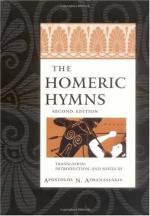The son of glorious Leto fares harping on his hollow harp to rocky Pytho, clad in his fragrant raiment that waxes not old, and beneath the golden plectrum winsomely sounds his lyre. Thence from earth to Olympus, fleet as thought, he goes to the House of Zeus, into the Consistory of the other Gods, and anon the Immortals bethink them of harp and minstrelsy. And all the Muses together with sweet voice in antiphonal chant replying, sing of the imperishable gifts of the Gods, and the sufferings of men, all that they endure from the hands of the undying Gods, lives witless and helpless, men unavailing to find remede for death or buckler against old age. Then the fair-tressed Graces and boon Hours, and Harmonia, and Hebe, and Aphrodite, daughter of Zeus, dance, holding each by the wrist the other’s hand, while among them sings one neither unlovely, nor of body contemptible, but divinely tall and fair, Artemis the Archer, nurtured with Apollo. Among them sport Ares, and the keen-eyed Bane of Argos, while Phoebus Apollo steps high and disposedly, playing the lyre, and the light issues round him from twinkling feet and fair-woven raiment. But all they are glad, seeing him so high of heart, Leto of the golden tresses, and Zeus the Counsellor, beholding their dear son as he takes his pastime among the deathless Gods.
How shall I hymn thee aright, howbeit thou art, in sooth, not hard to hymn? Shall I sing of thee in love and dalliance; how thou wentest forth to woo the maiden Azanian, with Ischys, peer of Gods, and Elation’s son of the goodly steeds, or with Phorbas, son of Triopes, or Amarynthus, or how with Leucippus and Leucippus’ wife, thyself on foot, he in the chariot . . .? {115} Or how first, seeking a place of oracle for men, thou camest down to earth, far-darting Apollo?
On Pieria first didst thou descend from Olympus, and pass by Lacmus, and Emathia, and Enienae, and through Perrhaebia, and speedily camest to Iolcus, and alight on Cenaeum in Euboea, renowned for galleys. On the Lelantian plain thou stoodest, but it pleased thee not there to stablish a temple and a grove. Thence thou didst cross Euripus, far-darting Apollo, and fare up the green hill divine, and thence camest speedily to Mycalessus and Teumesos of the bedded meadow grass, and thence to the place of woodclad Thebe, for as yet no mortals dwelt in Holy Thebe, nor yet were paths nor ways along Thebe’s wheat-bearing plain, but all was wild wood.
Thence forward journeying, Apollo, thou camest to Onchestus, the bright grove of Poseidon. There the new-broken colt takes breath again, weary though he be with dragging the goodly chariot; and to earth, skilled though he be, leaps down the charioteer, and fares on foot, while the horses for a while rattle along the empty car, with the reins on their necks, and if the car be broken in the grove of trees, their masters tend them there, and tilt the car and let it lie. Such is the rite from of old, and they pray to the King Poseidon, while the chariot is the God’s portion to keep.




